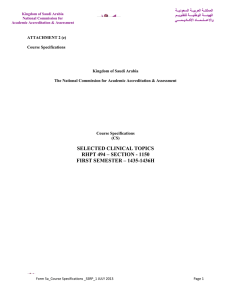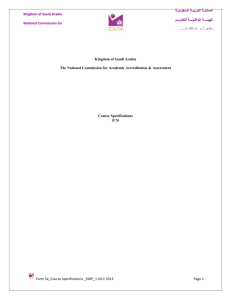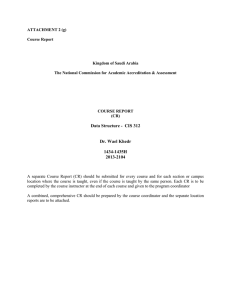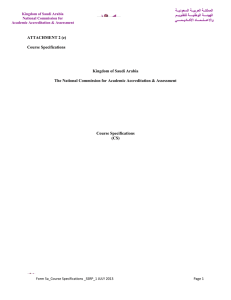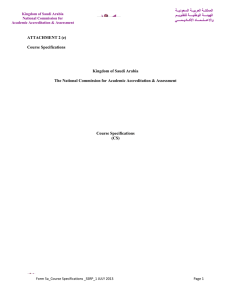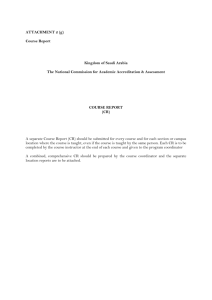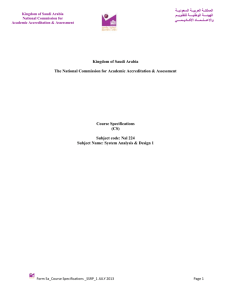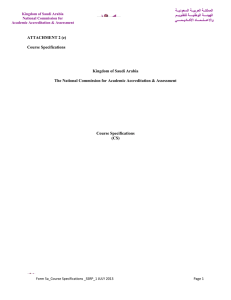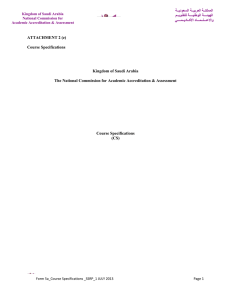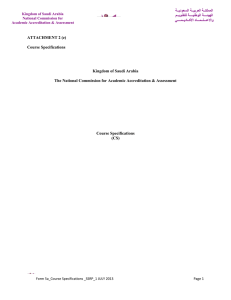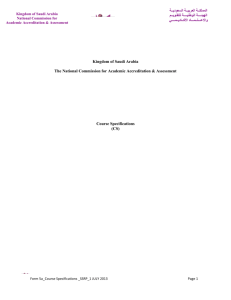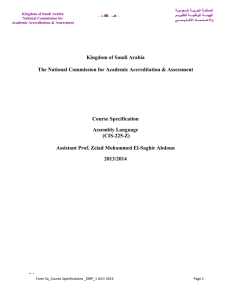توصيف مقرر الجبر الخطي
advertisement
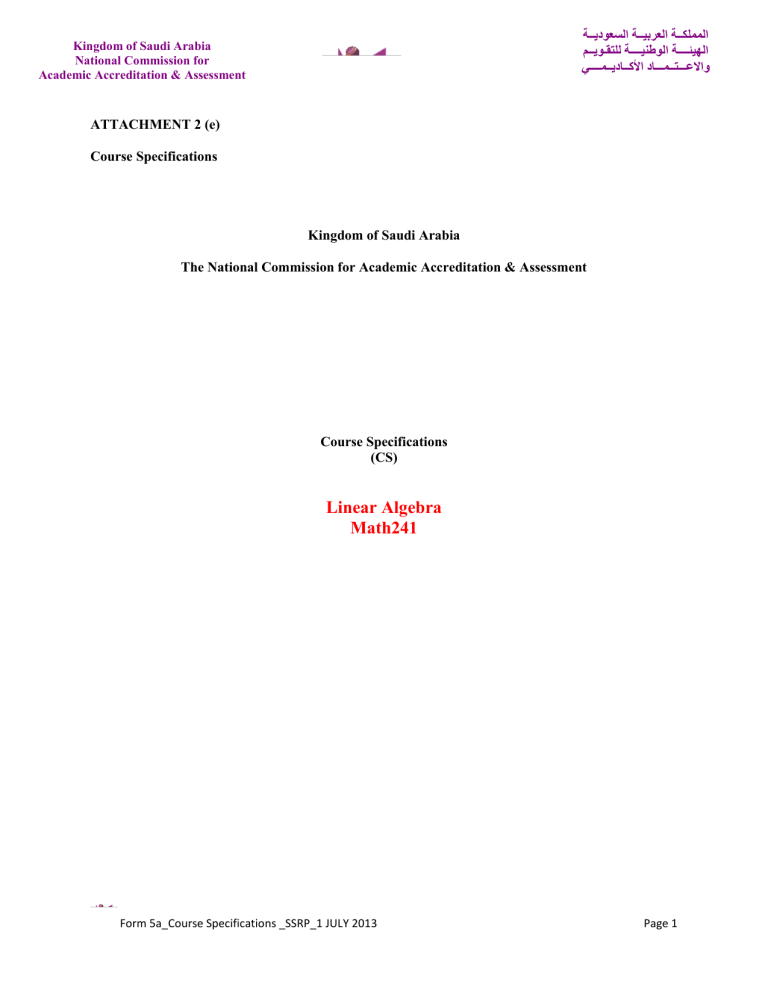
المملكــة العربيــة السعوديــة الهيئــــة الوطنيــــة للتقـويــم واالعـــتــمـــاد األكــاديــمــــي Kingdom of Saudi Arabia National Commission for Academic Accreditation & Assessment ATTACHMENT 2 (e) Course Specifications Kingdom of Saudi Arabia The National Commission for Academic Accreditation & Assessment Course Specifications (CS) Linear Algebra Math241 Form 5a_Course Specifications _SSRP_1 JULY 2013 Page 1 المملكــة العربيــة السعوديــة الهيئــــة الوطنيــــة للتقـويــم واالعـــتــمـــاد األكــاديــمــــي Kingdom of Saudi Arabia National Commission for Academic Accreditation & Assessment Course Specifications Institution Faculty of Science College/Department Date of Report 4/5/1434 Mathematics Department A. Course Identification and General Information 1. Course title and code: linear Algebra, Math241 2. Credit hours 4 Hours 3. Program(s) in which the course is offered. Mathematics (If general elective available in many programs indicate this rather than list programs) 4. Name of faculty member responsible for the course Ahmad Abd Allah Mohamed Zedan 5. Level/year at which this course is offered The fourth level 6. Pre-requisites for this course (if any) Basis of Mathematics, Math 231 7. Co-requisites for this course (if any) 8. Location if not on main campus Main Campus , Zulfi city 9. Mode of Instruction (mark all that apply) a. Traditional classroom What percentage? b. Blended (traditional and online) √ c. e-learning √ What percentage? What percentage? d. Correspondence What percentage? f. Other What percentage? 10 50 Comments: Form 5a_Course Specifications _SSRP_1 JULY 2013 Page 2 Kingdom of Saudi Arabia National Commission for Academic Accreditation & Assessment المملكــة العربيــة السعوديــة الهيئــــة الوطنيــــة للتقـويــم واالعـــتــمـــاد األكــاديــمــــي B Objectives 1. What is the main purpose for this course? Study of main concepts of linear algebra as follows: 1. Studying matrices and operations on them. 2. Studying the vector spaces, subspaces and their properties. 3. Solving system of homogeneous and non-homogeneous linear equation. 4. Have the knowledge of the basis and dimension of the vector space. 5. Have the knowledge of Linear operators and How to give it in a matrix form. 6. Have the knowledge of Eigen values and eigenvectors of a matrix and their properties. 7. Studying determinants and operations on them to compute the inverse of matrix. 2. Briefly describe any plans for developing and improving the course that are being implemented. (e.g. increased use of IT or web based reference material, changes in content as a result of new research in the field) 1-Cooprate with other educational institutions to find how they deal with the subject. 2- Re- new the course references frequently. 3-Frequently check the latest discovery in science to improve the course objectives. 4- The course needs the use of computers. 5- Posting some course material on the websites to help the students. 6- Focusing on generic skills. Form 5a_Course Specifications _SSRP_1 JULY 2013 Page 3 المملكــة العربيــة السعوديــة الهيئــــة الوطنيــــة للتقـويــم واالعـــتــمـــاد األكــاديــمــــي Kingdom of Saudi Arabia National Commission for Academic Accreditation & Assessment C. Course Description (Note: General description in the form to be used for the Bulletin or handbook should be attached) Topics to be cover Contact hours List of Topic Matrices and their operations- Types of matrices- Elementary transformation. Determinants-elementary properties of determinants- Inverse of a matrix- Rank of matrix- Linear systems of equations Mid-term 1 Vector spaces- Linear independence Finite dimensional spaces - Linear subspaces. Linear dependence and independence, basis and dimension(also, in subspaces), rank of a matrix, linear equations of vectors spaces, coordinates Mid-term 1 Linear mappings- Kernel and image of a No. of Weeks Lecture tutorials 9 3 6 2 3 Office Hours 1 Self- Study total Discussions Internet Library Homework 13 7 7 3 1 31 9 4 5 2 1 21 1 2 1 1 3 1 2 9 3 14 7 7 3 1 32 10 4 5 2 1 22 2 2 6 2 1 1 3 linear mappingEigenvalues and eigenvectors of a matrix and of a linear operator mapping. Review Final Exam Total Lab Total of contact 2 Form 5a_Course Specifications _SSRP_1 JULY 2013 1 1 9 3 6 2 1 13 7 7 3 1 31 9 4 5 2 1 21 6 4 2 166 4 2 8 76 33 Note: one credit hour is equal 25 – 30 load work hour 2 Page 4 36 15 المملكــة العربيــة السعوديــة الهيئــــة الوطنيــــة للتقـويــم واالعـــتــمـــاد األكــاديــمــــي Kingdom of Saudi Arabia National Commission for Academic Accreditation & Assessment 2. Course components (total contact hours and credits per semester): Credit NCCCA 4 ch Lecture 45 ECTS 6 cp 45 Contact Hours Tutorial Laboratory 15 Practical SelfStudy 90 Other Total 16 166 90 16 166 15 2. Additional private study/learning hours expected for students per week. 5-6 Hours 3. Course Learning Outcomes in NQF Domains of Learning and Alignment with Assessment Methods and Teaching Strategy 1.0 NQF Learning Domains And Course Learning Outcomes Knowledge 1.1 Define the fundamental in linear algebra such as: Course Teaching Strategies spaces and calculations of eigenvalues and Start each chapter by general idea and the benefit of it. Demonstrate the course eigenvectors. information and principles Systems of linear equations, matrices, Vector Course Assessment Methods Exams Midterms Final examination. through lectures. 1.2 Outline the logical thinking. Provide main ways to deal Home work. with the exercises. State the physical problems by mathematical Solve some examples method. during the lecture. 2.0 Cognitive Skills 2.1 The students will explain and interpret a general knowledge of Linear Algebra. Encourage the student to look for some complicated Continuous discussions with the students during the lectures. Midterm exams Quizzes. problems in the different Form 5a_Course Specifications _SSRP_1 JULY 2013 Page 5 المملكــة العربيــة السعوديــة الهيئــــة الوطنيــــة للتقـويــم واالعـــتــمـــاد األكــاديــمــــي Kingdom of Saudi Arabia National Commission for Academic Accreditation & Assessment references. 2.2 Enable students to analyses the mathematical problems. Student's ability to write mathematical equations in a correct mathematical way. 3.0 Interpersonal Skills & Responsibility 3.1 The student should illustrate how take up responsibility. Ask the student to attend lectures for practice solving problem. Homework assignments. Doing homework. Check the problems solution. Discussion of how to simplify or analyses some problems. Ask the students to search Quizzes of some previous lectures. Ask the absent students about last lecture. the internet and use the library. Encourage them how to attend lectures regularly by assigning marks for attendance. 3.2 Must be shown the ability of working independently and with groups. Discussion during the lecture. 4.0 Teach them how to cover missed lectures. Give students tasks of duties Communication, Information Technology, Numerical 4.1 The student should illustrate how to Creating working groups with peers to collectively prepare: solving problems and search the internet for some topics. Discussing group work Give the students tasks to measure their: mathematical skills, computational analysis and problem solving. Encourage the student to ask for help if needed. Discuses with them the results of computations analysis and problem solutions. communicating with: Peers, Lecturers and Community. 4.2 The student should interpret how to Know the basic mathematical principles using the internet. The student should appraise how to Use the computer skills and library. 5.0 The student should illustrate how to Search the internet and using software programs to deal with problems. Psychomotor Form 5a_Course Specifications _SSRP_1 JULY 2013 Encourage the student to ask good question to help solve the problem. sheets. Give homework's to know how the student understands the numerical skills. Give them comments on some resulting numbers. Page 6 المملكــة العربيــة السعوديــة الهيئــــة الوطنيــــة للتقـويــم واالعـــتــمـــاد األكــاديــمــــي Kingdom of Saudi Arabia National Commission for Academic Accreditation & Assessment 5.1 5.2 Not applicable Not applicable Not applicable Not applicable Not applicable Not applicable 5. Schedule of Assessment Tasks for Students During the Semester Assess Assessment task (eg. essay, test, group project, ment examination etc.) Week due Proportion of Final Assessment 1 Midterm 1 5th week 15 % 2 Midterm 1 15th week 15% 3 Homework + reports During the 10% semester 4 Final exam End of 60 % semester D. Student Academic Counseling and Support 1. Arrangements for availability of faculty and teaching staff for individual student consultations and academic advice. (include amount of time teaching staff are expected to be available each week) 1- 8-office hours per week in the lecturer schedule. 2- The contact with students by e-mail and website. E. Learning Resources 1. Required Text(s) Elementary Linear Algebra by: Howard Anton 2. Essential References 1) Elementary Linear Algebra with Applications by: Francis G. Florey. 2) Elementary Linear Algebra and its Applications by: James W. Daniel. 3- Recommended Books and Reference Material (Journals, Reports, etc) (Attach List): Same as mention above. 4-.Electronic Materials, Web Sites etc Form 5a_Course Specifications _SSRP_1 JULY 2013 Page 7 المملكــة العربيــة السعوديــة الهيئــــة الوطنيــــة للتقـويــم واالعـــتــمـــاد األكــاديــمــــي Kingdom of Saudi Arabia National Commission for Academic Accreditation & Assessment http://joshua.smcvt.edu/linearalgebra http://faculty.mu.edu.sa/azedan/Algebra 5- Other learning material such as computer-based programs/CD, professional standards/regulations: None F. Facilities Required Indicate requirements for the course including size of classrooms and laboratories (ie number of seats in classrooms and laboratories, extent of computer access etc.) 1. Accommodation (Lecture rooms, laboratories, etc.) -Classroom with capacity of 30-students. - Library. 2. Computing resources: Not available 3. Other resources (specify --eg. If specific laboratory equipment is required, list requirements or attach list): None G Course Evaluation and Improvement Processes 1 Strategies for Obtaining Student Feedback on Effectiveness of Teaching: Student evaluation electronically organized by the University. 2 Other Strategies for Evaluation of Teaching by the Instructor or by the Department The colleagues who teach the same course discuss together to evaluate their teaching. 3 Processes for Improvement of Teaching - Course report, Program report and Program self-study. - A tutorial lecture must be added to this course. 4. Processes for Verifying Standards of Student Achievement (eg. check marking by an independent member teaching staff of a sample of student work, periodic exchange and remarking of tests or a sample of assignments with staff at another institution) The instructors of the course are checking together and put a unique process of evaluation. Form 5a_Course Specifications _SSRP_1 JULY 2013 Page 8 المملكــة العربيــة السعوديــة الهيئــــة الوطنيــــة للتقـويــم واالعـــتــمـــاد األكــاديــمــــي Kingdom of Saudi Arabia National Commission for Academic Accreditation & Assessment 5 Describe the planning arrangements for periodically reviewing course effectiveness and planning for improvement. 1-The following points may help to get the course effectiveness: * Student evaluation. * Course report. * Program report. * Program self-study. 2- According to point 1 the plan of improvement should be given Faculty or Teaching Staff: Ahmad Abd Allah Mohamed Zedan Signature: Date Report Completed: ____________________ Received by: _____________________________ Dean/Department Head Signature: _______________________________ Date: _______________ Form 5a_Course Specifications _SSRP_1 JULY 2013 Page 9
